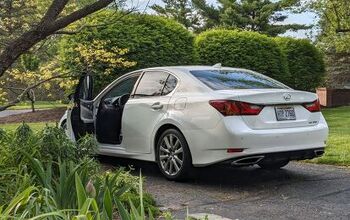Aporkalypse Now: The Pick Of The Litter
The great Detroit bailout of 2008 will not be debated in terms of economics. Free market considerations will take a back seat to the “consensus” on what’s good for our “national interest.” But Detroit is just one among many industries now nuzzling towards the warm embrace of a federal bailout. So what makes the American auto industry more equal than say, the mortgage sector or the airline industry? Not much, as it turns out.
In fact, mortgage giants Fannie Mae and Freddie Mac are already suckling upon the federal teat. Financial analysts say that taxpayers are facing a $300b bill for that already-underway bailout. Or more. For now. The staggering size and indeterminate endpoint of the terrible twins’ predicament creates the possibility of Motown-scuppering “bailout fatigue.” Meanwhile, the emerging details of the deal are sending Detroit a message: if you want public money, management must change, investors will take a bath and you’ll be placed under federal “conservatorship.”
This not what Detroit wants to hear, never mind experience. Hence the Big 2.8’s relentless “not a bailout” rhetoric. But even the most devout industry backers have to understand the populist appeal of “letting Detroit choke on its own SUVs” rhetoric. America does not love a loser, let alone a litter of them.
And push come to [unexpected fiscal conservativism revival] shove, D.C. will back the financial giants before Detroit. In fact, much of The D2.8’s recent financing came from the very structured investment vehicles that the Fed is propping-up by backing Fannie and Freddie. Every Detroit exec worth his country club membership would prefer $300b in bailout fatigue over a post-F&F credit market.
But yet another hungry mouth looms over the government trough, anxious to secure patriotic assistance in hard times. The airline industry is on course to lose $5.2b this year, and another $4.1b in 2009. Another flagship American enterprise, and the source of much national pride could just need our collective help… again.
And once again, the parallels to Detroit are eerie. A rapid rise in fuel costs that “nobody saw coming,” perennial legacy costs and crippling labor relations bind automakers and airlines in common misery. What’s more, both trumpet their necessity to the American economy while consistently having their lunch eaten by lean, mean competitors.
The airlines are not currently proposing bailout schemes with the “no bad publicity” shamelessness of Detroit. But when automakers come a-begging, the airline industry parallels will (or should) be brought up by los federales. Why? Because the major airlines are the living dead of corporate welfare necromancy past.
From the $15b “great patriotic bailout” post 9/11, to ongoing “reserve air fleet” payments, from protectionist ownership laws, to Reagan’s infamous strike-busting, the feds have done much to assist the airlines. And what do the taxpayers get for the trouble? Giant firms, dead on their feet, slouching towards bankruptcy court. Or, yet another bailout.
The travails of the airline industry and the F&F unraveling are not the only potential roadblocks to Detroit’s campaign on the Potomac. There’s even a chance that lawmakers might hold American automakers to account– not only for its poor business practices– but for its profligacy with pork long since digested.
The New Chrysler of today is hardly a ringing endorsement of the kind of “loans for retooling” bailout being shopped around. It’s hard to draw causal links between the bailout of ’79 and Auburn Hills’ current plight. Too much water has flowed under the bridge for such a sweeping claim. But, Chrysler’s precipitous downfall proved (if nothing else) how fleeting a bailout can be.
Detroit has also handily proven that government handouts given to the industry as a whole are even more wasteful. In 1993, the government created The Project For A New Generation Of Vehicles (PNGV) to help Detroit build 80 mpg sedans for everyone. Eight years and over a billion bucks later, Ford, GM and Chrysler had each built one “working prototype,” capable of 72 mpg or better.
This was the chance for Detroit to invest intelligently in R&D to prepare for a fuel price shock it “never saw coming.” Instead, $1b+ bought Americans three unobtainable diesel-electric hybrid cars. PNGV research helped clean-diesel and fuel-cell development, but where are these cars of the future?
The pressure is on politicians from all sides to protect their nation’s economy. Since Freddie and Fannie have been deemed too big to fail, the others must wait in line. But Detroit is no more deserving of federal loans than anyone else, but presents a poor track record and little hope for the future. When all is said and done, there’s still a chance that DC could just say no.
More by Edward Niedermeyer
Latest Car Reviews
Read moreLatest Product Reviews
Read moreRecent Comments
- Jkross22 You know that feeling you get when you're nervous and you can feel it in your gut? Everytime I see one of these I get that. Yeah, they look great. Yeah, it'll be the worst decision of the year. And next year. And the year after that.
- Redapple2 Style looks good. Maybe better now than when new. (is that possible?)Had one. New. 2 yr supplier lease deal. In the shop 2x in the first 5000 miles. Now I drive Japanese products.
- Aja8888 Yes, the timing chains are OK, for now...............🤥
- James Jones The only thing that concerns ,me is a government-mandated back door--you get in and your car drives you to the police station where yo are arrested for crimes against the state, or "you can't drive because we must achieve our energy conservation goals". Not to mention that once there's a back door, any sufficiently smart person can use it--you can't create a back door only usable by those whose hearts are true. So then there'd be the risk of someone telling my self-driving car to drive off the side of a mountain/into a river/etc.
- 3-On-The-Tree Jeff I also have a 1980 Suzuki GS1000G I rode during college and it was a lot of fun. My other bike was a 1977 Suzuki GT 750 2 stroke. My post army retirement time will be restoring those old bikes next to the 02 Hayabusa, 05 Suzuki Vstrom and klr 650. I love riding but at much reduced speeds nowadays. I got it out of my system as a young flight Lieutenant.

































Comments
Join the conversation
@ philipwitak: "seems to me that those who benefit most from our economy and society’s generous accommodation - the wealthy - are obviously able, and should be willing, to pay for the privilege." So by this logic I could sit at home and eat bonbons all day but I wouldn't be earning any of the "benifits" of society you speak of. And because of that those who do work should pay back some of their "benifits" from working to me in the form of a nice juicy government check every month. I like this land you speak of!
Philip, I think you need to read my post again, and try to think about what I meant before responding. As for the whole new argument you offer, it is not about taxation, it is about capitalism. Perhaps you should try not using the word "exploit". One can use that word in a positive or negative way and it has completely very different meanings. At any rate, it seems to me, and I am not trying to put words in your mouth, that you are mostly focused on CEO pay. I will be happy to agree that CEO's are often overpaid. That is not the point here AT ALL. Taxation is not the only way to attack that problem, and in fact, it is the worst way available. In case you are not aware, there are a LOT of people in our society who are not making their value by simply paying low for labor while charging high rates for the production. And how does it help to raise their taxes? Is your plan to KEEP them from hiring more workers who they will be exploiting? As a side note, if the Dept. of Labor (or whatever new fangled name it now has) wants to reduce the pay gap, all they have to do is give better information on what people working full time, with various levels of experience, in different vocations, ACTUALLY MAKE. The CEO's have successfully used the legal reporting of their pay packages to raise their pay as a group. The lies put out about different pay for other folks is used to keep their pay down. Your tax dollars at work.